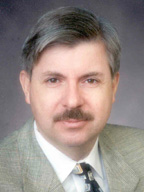 |
Peter Kador, Ph.D. |
A UNMC researcher has developed a unique series of compounds that have the potential to treat age-related eye conditions and neurodegenerative disorders.
Peter Kador, Ph.D., a UNMC pharmaceutical science professor, developed a group of multifunctional compounds that act as antioxidants and selective metal chelators.
A chelator is an organic chemical that complexes with and removes free metal ions from solutions. High levels of iron and copper are present in those with Alzheimer’s and Parkinson’s disease, cataracts and macular degeneration.
Dr. Kador took one treatment for these disorders — antioxidants — and combined them with metal chelators to produce orally active compounds. Once ingested, the compounds enter the eye and brain.
In cultured human lens epithelial cells, these compounds reduced the production of reactive oxygen species (ROS) catalyzed by copper or iron. In addition, they reduced ROS-generated cataract formation in several rodent animal models. Metal-catalyzed ROS formation is believed to be a major cause of these disorders.
“This is the first orally active series of compounds that both chelate metals and are potent antioxidants that have been shown to get into the retina, lens and brain,” he said.
Dr. Kador also has found that these compounds appear to prevent radiation damage to the salivary gland.
“We are excited about the potential that these compounds show for improving the treatment of ROS-mediated disorders” said Steve Schreiner, Ph.D., senior licensing associate at UNeMed, the technology licensing arm of UNMC.